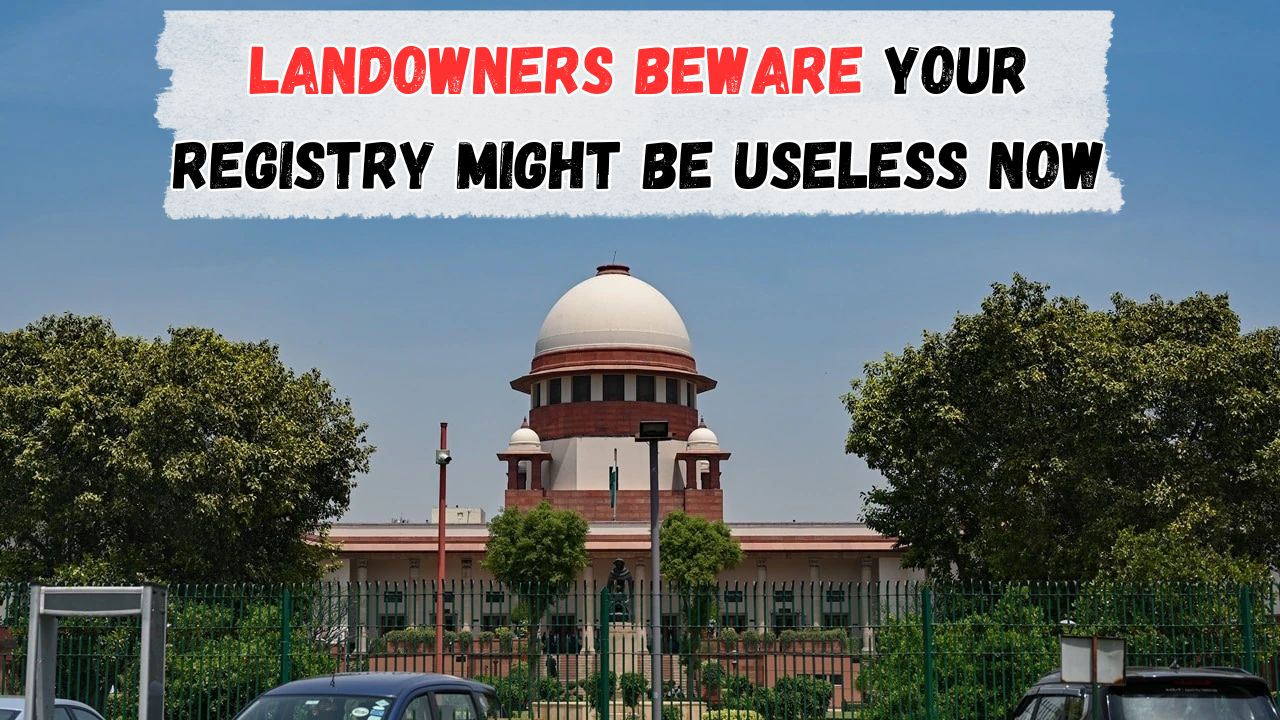Property Dispute – In a significant judgment that will impact countless property transactions across India, the Supreme Court has ruled that having a property registered in your name is not enough to claim full ownership rights. This decision comes as a crucial clarification in the midst of growing legal confusion over property titles, registry documents, and actual ownership proof. The court emphasized the importance of a legal and valid title deed, rather than merely a registered sale agreement, as evidence of ownership. This verdict has major implications for buyers, sellers, and those involved in property disputes. It underlines the need for thorough due diligence beyond just verifying a registered deed.
What Was the Case About?
The ruling came in response to a long-standing property dispute where one party claimed ownership solely based on a registered agreement. The other party argued that the registration was not backed by a clear title and that true ownership could not be determined by the registry alone.
Key Highlights of the Case:
- Supreme Court dismissed registry-only claims as insufficient.
- Emphasis placed on title deeds and chain of ownership.
- The judgment is applicable nationwide and affects all types of property transactions.
Supreme Court’s Key Observations
The apex court highlighted several important points regarding property transactions and legal ownership in India.
Supreme Court Statements:
- Registration of a document does not confer title if the title was defective or not with the seller.
- Title must originate from the rightful owner and be backed by proper documentation.
- Possession, intention, and actual ownership rights carry more weight than a mere registered agreement.
Difference Between Registry and Title Ownership
Understanding the difference between a registry and actual ownership is essential for anyone involved in real estate transactions.
| Aspect | Registry Document | Title Ownership |
|---|---|---|
| Legal Validity | Proof of a transaction | Proof of ownership |
| Possession Rights | Not necessarily granted | Required to claim ownership |
| Challenge in Court | Can be challenged | Stronger legal backing |
| Verification Requirement | Needs deeper verification | Title deed must show full chain of ownership |
| Role in Sale | Important but not conclusive | Crucial and decisive |
| Fraud Risk | Higher in registry-only deals | Lower when proper title exists |
| Acceptance in Court | Subject to challenge | Generally holds stronger legal ground |
| Common Misconception | Registry = Ownership | True ownership = Verified title with registry |
Implications for Property Buyers
The verdict is a wake-up call for all property buyers who rely solely on registry documents for property purchases.
Buyers Must Now:
- Insist on complete title search before purchase.
- Check for any pending litigation or third-party claims.
- Verify the entire chain of ownership – not just the latest registry.
- Consult a legal expert before finalizing transactions.
Potential Risks If Ignored:
- Losing property due to previous owner’s faulty title.
- Getting entangled in long legal battles.
- Losing investment if ownership is challenged successfully.
Impact on Real Estate Transactions
The ruling sets a precedent for real estate agents, developers, and legal advisors. All property transactions will now be expected to meet higher scrutiny.
Real Estate Sector Will See:
- Increase in demand for title verification services.
- Higher due diligence costs for buyers.
- Better awareness among rural and urban buyers alike.
- Banks and financial institutions may become stricter with property loan disbursals.
What Buyers and Sellers Should Do Now
To ensure a legally secure transaction, both parties must follow a rigorous verification process.
| Step | What to Check | Why It’s Important |
|---|---|---|
| 1 | Title Deed and Chain of Ownership | Confirms actual ownership |
| 2 | Encumbrance Certificate | Ensures no legal dues or mortgage |
| 3 | Property Tax Receipts | Shows regularity and legal recognition |
| 4 | Mutation Records | Confirms update in local municipal records |
| 5 | Legal Opinion from Advocate | Prevents future disputes |
| 6 | Seller Identity & Authority to Sell | Prevents fraud and impersonation |
| 7 | Physical Inspection and Possession | Avoids disputes with tenants or occupiers |
| 8 | Approved Building Plan (for flats/plots) | Verifies legality of structure |
The Supreme Court’s judgment is a vital reminder that owning a registered property document does not automatically translate into true ownership. Buyers must be vigilant, well-informed, and proactive in verifying title authenticity before finalizing any property deal. This verdict will likely prompt regulatory authorities to strengthen property verification norms and reduce litigation in the future.
FAQs
Q1. Does registration of a property make me the legal owner?
No, registration is not proof of ownership unless the seller had a valid title. Ownership must be backed by legal title deeds and a clear chain of ownership.
Q2. What is the difference between a registered sale deed and a title deed?
A registered sale deed is proof of a transaction, whereas a title deed confirms actual legal ownership.
Q3. Can I lose my property if it’s only registered but has no valid title?
Yes, if someone else can prove superior ownership rights, your registry alone may not protect you in court.
Q4. What documents should I verify before buying a property?
Check title deed, encumbrance certificate, tax records, mutation records, and obtain legal advice to avoid fraud.
Q5. How does this ruling affect existing property owners?
Those who rely only on registry without checking title validity may face legal challenges. It is advisable to verify title even for already owned property.
